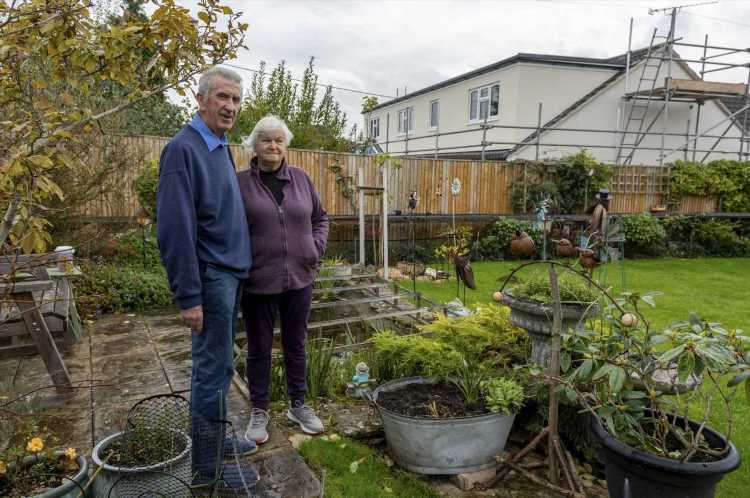RESIDENTS have slammed a neighbour's bungalow loft conversion – claiming it ''towers over our homes".
Homeowners in the rural village in Wiltshire also allege that Harriet and Aaron Baines have "robbed them of privacy".
And they accuse the couple – who began work on their "home improvement" in July – of having doubled the size of their house.
Ahead of the build, the Baineses said: "We apologise in advance for any temporary inconveniences this project may cause and appreciate your understanding and support."
And speaking at his home today, when asked about the allegations, Aaron Baines said he did not wish to comment.
It comes as close neighbours say they bombarded Wiltshire Council with objection letters when they first saw the scale of the development.
Read More neighbour rows

Shocking moment cop Tasers boy in 'school uniform' after ‘neighbour row’

Katie Price in neighbour row at new house as Carl is reported to council
The couple believed they had permitted development rights to go ahead with the plans, but were informed by the council last month that they actually required planning permission.
They are understood to have permitted development rights for home improvements, but this does not cover "major construction works" such as, in this case, an entire roof extension.
But neighbours say the loft conversion now towers over their garden fences and will turn a three-bed, two-bath bungalow into a six-bed, four-bath home.
Raymond Hazel slammed the Baineses for the "overbearing and obtrusive" conversion.
Most read in Money

‘Huge sadness’ as pub chain closes ALL locations due to spiralling costs

Martin Lewis’ MSE reveals six gadgets to help you avoid turning on the heating

I tried McDonald’s new burger & McFlurry flavour – they’re unlike anything else

Major card chain suddenly closes store as 38 branches face being axed
He added: "It also appears the new owners have no consideration for their neighbours’ privacy."
Neighbour Derek Peters says he and wife Lesley enjoy sitting in their garden to watch their pond, but are now overlooked by the new loft conversion.
Parish council chairman Ernie Clark called in the plans following the concerns, saying: "I am shocked at the direct overlooking and absolute loss of privacy which this application will cause."
Mrs Baines told Wiltshire Council she "understood all works were under permitted development", until she was told by a council officer on September 20 they weren't.
The officer said despite the works usually not requiring planning, the fact permitted developments rights were removed means they now need permission.
Residents have until Thursday, October 26 to comment on the couple's plans.
Wiltshire Council hopes to make a decision on November 23.
The Baineses gave no comment when approached by The Sun.
What are permitted development rights?
- Depending on the scale of the work, it is often necessary to apply to your local council for planning permission.
- However, if you are willing to work within certain limits, there are things you can do without having to apply for planning permission at all.
- Permitted development rights are rules which apply to homes in England and allow improvement or extension without the need to apply for planning permission.
- As well as allowing developers to change buildings such as offices into homes, they allow homeowners to build small extensions.
- However, some housing estates have clauses in the deeds which exclude permitted development rights.
- Having permitted development rights does not also mean you can build whatever you want.
- You may have permitted development rights for home improvements, but this does not cover "major construction works"
- Any space added by previous owners of the house counts towards your permitted development allocation – so you don’t wipe the slate clean when you buy a new house.
- And the the local planning authority may remove some of your permitted development rights by issuing an 'Article 4' direction.
- This will mean that you have to submit a planning application for work which normally does not need one.
- Sometimes this is done when the council want to control development in a particular area.
Source: Read Full Article






